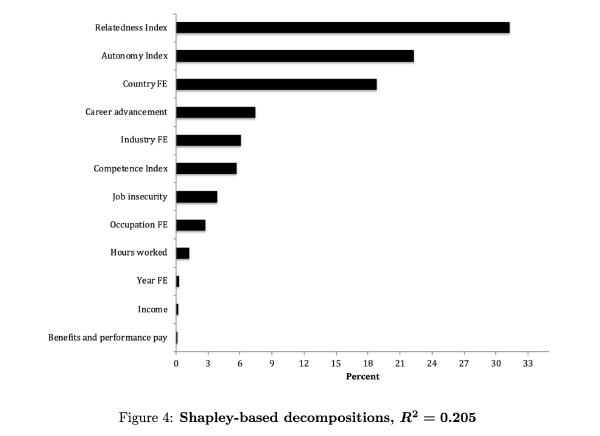How to make work meaningful

By Rob Knight
What motivates us to work and collaborate with others?
There are many answers, but they can be divided into two categories. There are extrinsic motivations, such as pay and social prestige, and intrinsic motivations such as a sense of accomplishment or meaningfulness. We need a balance of both, but recent studies show that certain intrinsic motivations can be much more important - even more important than salary level. If you’re struggling to motivate yourself or your colleagues, perhaps your problem is that work doesn’t feel very meaningful.
Then what makes work meaningful? Using data from the European Working Conditions Survey, a 2020 paper from Nikolova and Cnossen has found that the most important factors for meaning in work are relatedness and autonomy.

Relatedness is about our relationships to others, our colleagues and managers. Autonomy is about our ability to make choices in what we do, how we do it, and the priority we give to our different goals. Without either of these things, we are more likely to feel that our work is meaningless. This can ultimately lead a person to leave for more meaningful work elsewhere.
Feeling related to others
Workers feel related if they experience genuine care from their bosses or colleagues, and that they care about their superiors and co-workers in return
If nobody cares about you, or what you are working on, then it will be quite easy to feel that your work is meaningless. Imagine completing tasks day after day, but never knowing if anyone appreciates your efforts. Or imagine not knowing how your work connects to the work your colleagues are doing, or which person to thank when something important is completed.
Relatedness isn’t just about the relatedness of work, but about treating each other as people. When we divide our organizations into teams and departments, we can lose sight of the individuals we are collaborating with. Truly inter-personal collaboration means that we see the whole person, and can understand their needs and how best to support them.
Sometimes, procedures and management styles can get in the way of this. Workflow management systems encourage us to care about the flow of work, but not about the personal relationships that make that work possible. If you use a project management system, perhaps you have had the experience of writing a ticket that describes some work to be done, without knowing which person that work will be assigned to. This impersonal approach is sometimes necessary, but often it creates a disconnect between people who should be collaborating closely. When you know who you are working with, you can build a shared understanding with that person that helps both of you to understand each other better. This makes the work more likely to be successful, and increases your ability to support each other intelligently.
Having autonomy over work and process
Autonomy is empirically linked to meaningfulness (Martela and Riekki, 2018; Martela et al., 2018; Ryan and Deci, 2000) because it allows for self-expression, control over the work content and process, and the ability to choose how and when to apply different skills and capabilities.
As we progress in our careers, we hope to become more capable and more skilled, able to make better decisions and get better results. To continue to improve, we need greater autonomy. The choices we make about our work have to matter, so that we can learn meaningful things and make meaningful improvements as a result.
Autonomy does not mean total independence, because we are still relying on our colleagues and they are still relying on us. Within the constraints of our responsibilities, it is better for people to be able to choose what seems like the best way of fulfilling them. If that choice turns out to be a mistake, then it is a valuable opportunity to learn and improve, and a person who learns more frequently will become more skilled much faster than someone who does not.
This can be a difficult balance to strike. Those who are more senior can find it difficult to let more junior colleagues have autonomy, because they find it easier to tell them what to do. In the short run, this might be the most efficient approach. But in the long run, it is often most effective to help those junior colleagues gain experience of planning and decision-making for themselves. An ideal way to bridge this gap is to collaborate, so that the planning is done together, giving the junior colleague a chance to make their own proposals. As they gain experience, they can be given fewer direct instructions, with bigger tasks being delegated.
How can we design meaningful workplaces?
As Nikolova and Cnossen show, relatedness and autonomy are by far the most important factors in making work meaningful. To create meaning in work, we should ensure that these factors are present.
To increase relatedness, we should encourage people to build collaborative relationships. Work isn’t just about the things we do, it’s about the people we collaborate with. Instead of seeing our work only as a list of things to be done, we can see it as a set of collaborations. This helps us to understand how our work matters to other people. It also helps us to understand how we are part of a network of people relying on each other to get things done, not just cogs in a machine. As we begin to build deeper relationships with our colleagues, we can understand their perspectives better and improve our ability to work with them.
With Legra, this can be achieved using shared intents. These are collaborative aims which both collaborators have a copy of, with one person relying on the other to complete the intent. Instead of to-do list items which emerge from nowhere, work is part of an ongoing collaborative relationship. Because shared intents can connect to each other, we can even see the whole social network of collaborations within the organization.
To increase autonomy, we have to encourage true collaboration. Because each collaboration is inter-personal, the collaborators have freedom to work out the best ways to work together. You may have someone relying on you, but you are free to propose the best way to make that thing happen. You can also be free to enlist others to help, where their skills are required. Each person has the potential to make decisions about what needs to be done and the best ways to do it. Such decisions are never made in total isolation, as the needs of the whole organization are always most important, but autonomy lets us find the best ways to meet those needs.
Legra’s shared intents create this kind of autonomy. In any collaboration, responsibility and autonomy go together. If you are taking responsibility for something, you have the power to decide how you’re going to do it, and who else you might need to rely on to help you. By clearly allocating responsibility, we create a natural space for autonomy.
At Legra we want to build the next generation of meaningful workplaces. If you’d like to talk to us about how we can help, please sign up and begin your journey to more meaningful work.